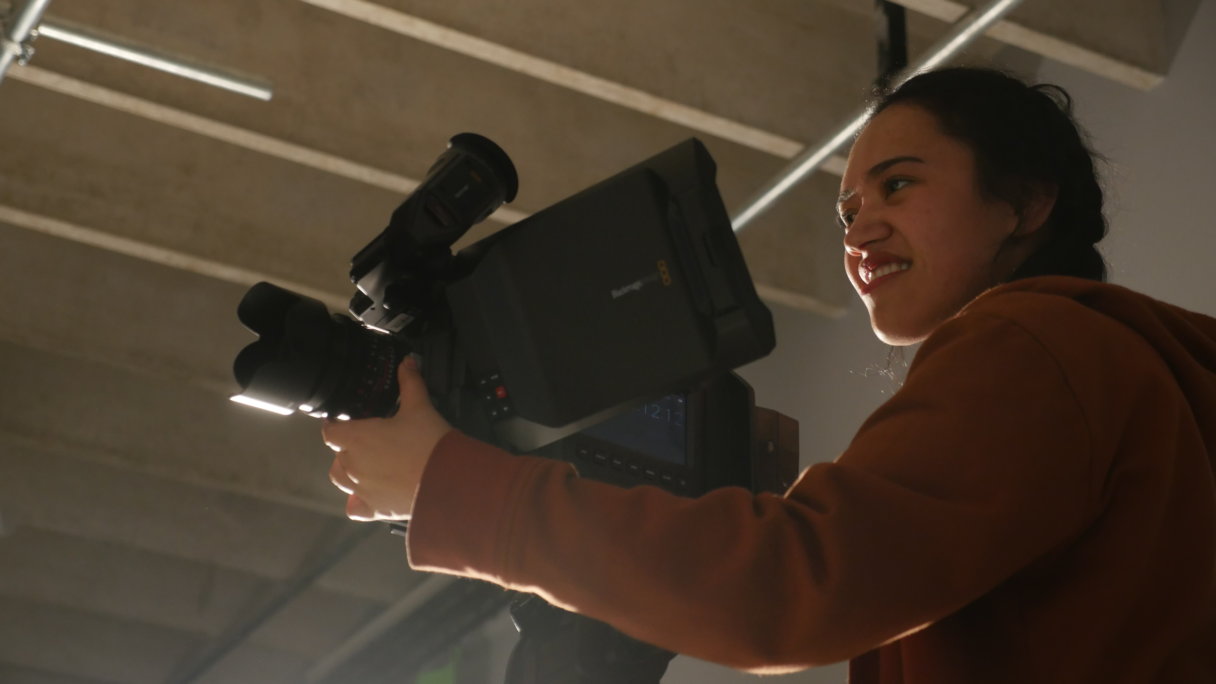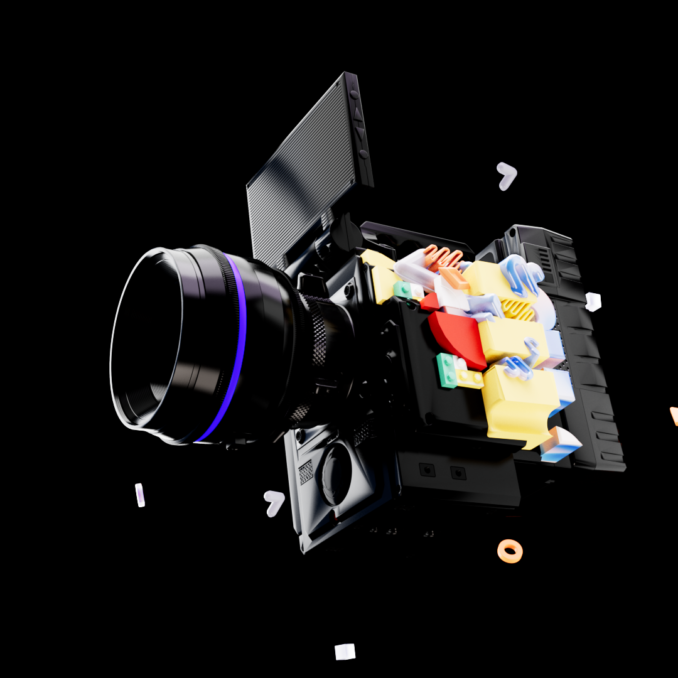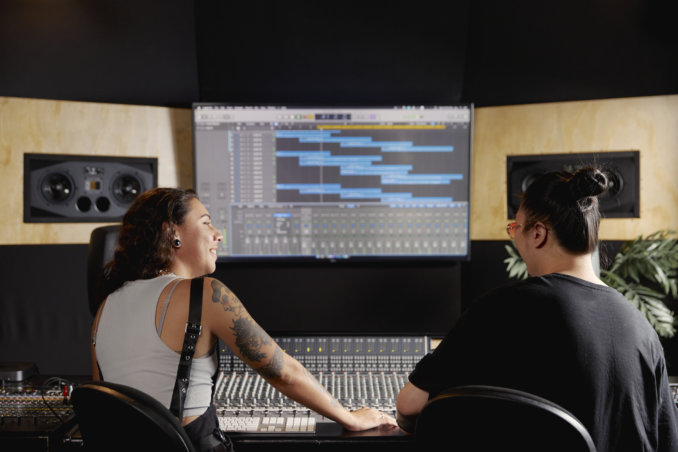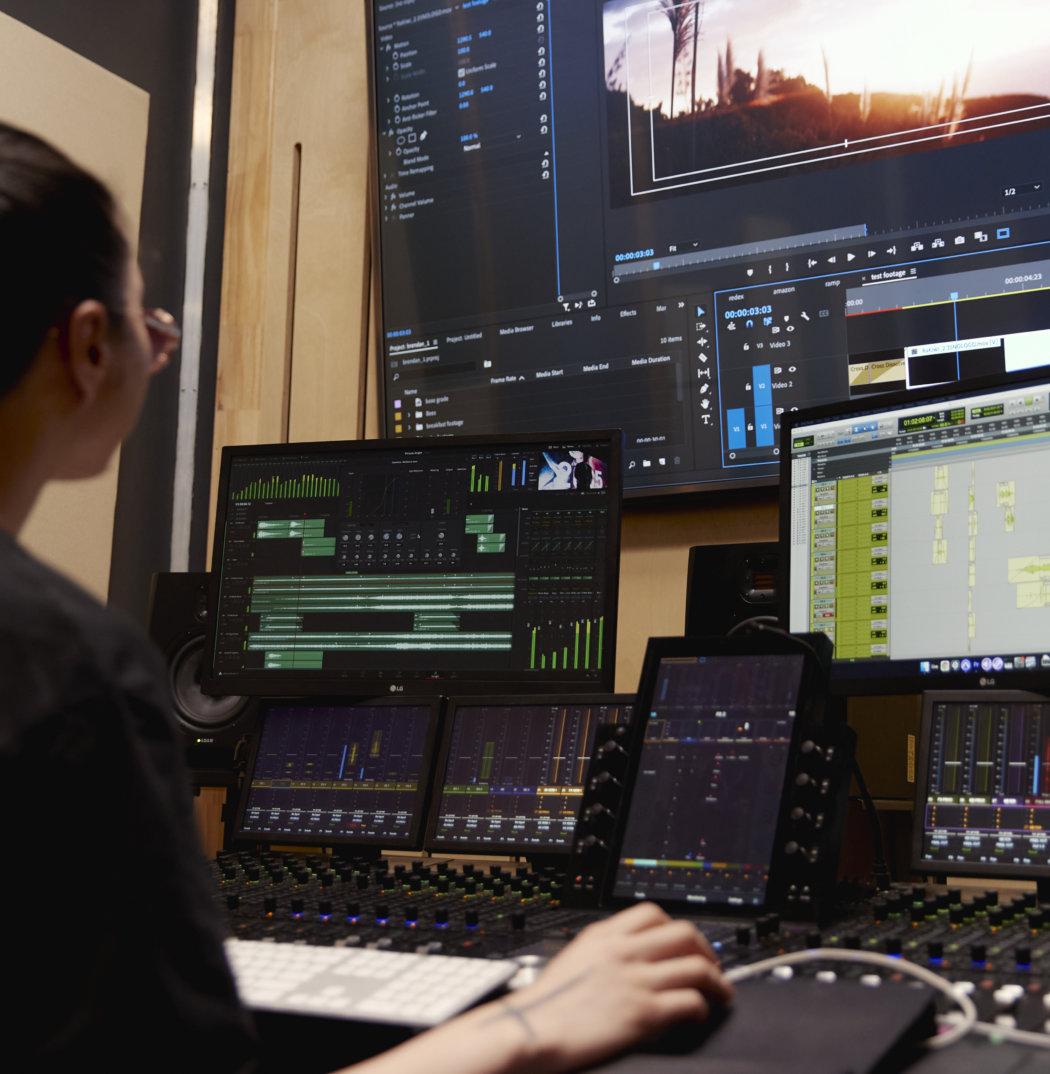Diploma in Screen Production
MAKE YOUR ESTABLISHING SHOT IN FILM
Available at
Auckland
Fees
Diploma in Screen Production
Domestic Fees
$11,981 NZD
Year One (Level 5)
Administration Fee: $500.00 (one-off fee)
Tuition Fee: $11,981
Domestic Students Only
Programme fees may be paid by Student Loan. Fees must be paid annually, prior to the commencement of study.
This programme receives funding from TEC and is NZQA approved, therefore is eligible for the ‘Fees Free’ scheme. To determine your eligibility, visit feesfree.govt.nz
For any queries regarding payment please contact: [email protected]
Diploma in Screen Production
International Fees
$26,762 NZD
Year One (Level 5)
Administration Fee: $500.00 (one-off fee)
Tuition Fee: $26,762
Fees must be paid annually, prior to the commencement of study.
For any queries regarding payment please contact: [email protected]
Duration(s)
Full time: 1 year
Diploma
Diploma in Screen Production
Course Durations
Full time: 1 year
Diploma
Start Date(s)
Auckland
February 2025
Diploma in Screen Production
Start Dates
Auckland
February 2025
Entry Requirements
Diploma in Screen Production
Domestic Entry Requirements
A copy of the student's valid photo ID must be provided.
Candidates are required to have gained a minimum of NCEA Level 2
Special Admission
Domestic applicants aged 20 years or above who have not met the General Admission or entry requirements for a programme but whose skills, education or work experience indicate that they have a reasonable chance of success may be eligible for Special Admission. Special admission will be granted at the discretion of the Academic Manager or designated nominee. Such applicants may be required to successfully complete a foundation, bridging or tertiary introduction programme as a condition of entry into higher level programmes.
Provisional Admission
Domestic applicants aged under 20 years who have not met the general academic admission and entry criteria for a programme but who can demonstrate a reasonable chance of success through other educational attainment and/or work or life experience may be eligible for provisional entry at the discretion of the Academic Manager. Provisional entry places restrictions on re-enrolment to be lifted if the applicant’s performance is deemed satisfactory by the Academic Manager.
English as an Additional Language Applicant requirement.
English as an Additional Language (EAL) applicants, including NZ Residents must meet standard NZQA minimum English Proficiency Outcomes for a diploma programme, i.e. for the academic version of IELTS they will require a score of 6 with no band score lower than 5.5, or acceptable equivalent as per the Code of Practice for the Pastoral Care of International Students.
An applicant must be a minimum of 17 years at the start date of the programme. Applicants aged less than 18 years old must apply with parental/guardian consent.
All students are given the tutorial and pastoral support needed to satisfactorily engage with the academic and technical demands of the programme, and in particular students entering with the minimum qualification of NCEA Level 2.
All entry is at the discretion of the Academic Manager.
Diploma in Screen Production
International Entry Requirements
Minimum Age: International students seeking admission to SAE must be at least 18 years of age at the time of application.
Proof of Identity: A copy of the student's valid passport must be provided.
Academic Requirements: Completion of the equivalent of NCEA Level 3 or University Entrance qualification.
English Language Requirements
International students who are not native English speakers need to provide additional evidence of language skills and complete one of the following:
International English Language Testing System (IELTS): A band score of 6 or higher (only the Academic Test is accepted), OR
Test of English as a Foreign Language (TOEFL): A score of 550 or higher (paper based test), 60 or higher (internet based test)
All entry is at the discretion of the Academic Manager.
Selection Process
Where there are more applicants than the number of places available a selection process may be applied. An offer of place in a diploma or degree programme would be extended to applicants who meet the entry criteria and demonstrate the potential to successfully complete the programme on the basis of:
A portfolio of work that represents the applicant’s level of achievement.
An interview.
Curriculum vitae (optional).
Applicants who submit a formal application to enrol in the programme, and who meet the entry criteria would be invited to submit a portfolio of work and participate in an interview. The purpose of the interview is to assess the applicants’ suitability for the programme. It will determine whether an applicant is offered a place in the programme, and if so, at what level of the programme the applicant will be offered a place. Applicants would be welcome to enlist whānau support.
MAKE YOUR ESTABLISHING SHOT IN FILM
You'll explore:
Develop storylines and treatments
Historical perspective of film history
Plan and shoot a wide range of content
Integrate live-action footage with visual effects
Manage media assets
Record sound on location
Basic audio mixing
Ensure a safe workplace
Course Structure
The Diploma of Screen Production is the first step towards a Bachelor of Screen Production
Trimester 1
Credit Points: 30
This 36-week course provides a platform for engagement with transferable skills via collaborative client projects which may include contracted roles within projects of more advanced student groups. With a key focus on employability in Aotearoa/New Zealand students engage with professional practice situated in the holistic ideals of Te Ao Maori. Students conduct peer review via the Transferable Skills Matrix in an effort to foster and develop employability skills.
This 36-week course provides a platform for engagement with transferable skills via collaborative client projects which may include contracted roles within projects of more advanced student groups. With a key focus on employability in Aotearoa/New Zealand students engage with professional practice situated in the holistic ideals of Te Ao Maori. Students conduct peer review via the Transferable Skills Matrix in an effort to foster and develop employability skills.
Credit Points: 15
This course brings foundational knowledge of film pre-production, production and post-production blended with an introduction to critical film theory. Using a contextual framework students will develop production skills and knowledge of the film industry in an economic context. Students are introduced to filmmaking equipment, software techniques, storytelling, and intro to screenwriting amongst others.
This course brings foundational knowledge of film pre-production, production and post-production blended with an introduction to critical film theory. Using a contextual framework students will develop production skills and knowledge of the film industry in an economic context. Students are introduced to filmmaking equipment, software techniques, storytelling, and intro to screenwriting amongst others.
Credit Points: 15
In this project students will produce a documentary and consider social contexts of the screen production industry. Students will work in teams, using technical and problem solving skills to create stories that have an intended audience and theme. Through production and post-production, students are trained in a variety of context-specific frameworks.
In this project students will produce a documentary and consider social contexts of the screen production industry. Students will work in teams, using technical and problem solving skills to create stories that have an intended audience and theme. Through production and post-production, students are trained in a variety of context-specific frameworks.
Trimester 2
Credit Points: 30
This 36-week course provides a platform for engagement with transferable skills via collaborative client projects which may include contracted roles within projects of more advanced student groups. With a key focus on employability in Aotearoa/New Zealand students engage with professional practice situated in the holistic ideals of Te Ao Maori. Students conduct peer review via the Transferable Skills Matrix in an effort to foster and develop employability skills.
This 36-week course provides a platform for engagement with transferable skills via collaborative client projects which may include contracted roles within projects of more advanced student groups. With a key focus on employability in Aotearoa/New Zealand students engage with professional practice situated in the holistic ideals of Te Ao Maori. Students conduct peer review via the Transferable Skills Matrix in an effort to foster and develop employability skills.
Credit Points: 15
Students will examine both the technical and artistic elements of multiple genres and will create a project that references, remixes or responds to a genre’s conventions. Lighting, camera, and other related screen and narrative techniques will be introduced and developed throughout this foundation course.
Students will examine both the technical and artistic elements of multiple genres and will create a project that references, remixes or responds to a genre’s conventions. Lighting, camera, and other related screen and narrative techniques will be introduced and developed throughout this foundation course.
Credit Points: 15
Students will develop skills in planning, production, and post-production of visual effects and compositing through the context of a genre. Students will plan and shoot a production for composited imagery to be implemented in post-production.
Students will develop skills in planning, production, and post-production of visual effects and compositing through the context of a genre. Students will plan and shoot a production for composited imagery to be implemented in post-production.
Trimester 3
Credit Points: 30
This 36-week course provides a platform for engagement with transferable skills via collaborative client projects which may include contracted roles within projects of more advanced student groups. With a key focus on employability in Aotearoa/New Zealand students engage with professional practice situated in the holistic ideals of Te Ao Maori. Students conduct peer review via the Transferable Skills Matrix in an effort to foster and develop employability skills.
This 36-week course provides a platform for engagement with transferable skills via collaborative client projects which may include contracted roles within projects of more advanced student groups. With a key focus on employability in Aotearoa/New Zealand students engage with professional practice situated in the holistic ideals of Te Ao Maori. Students conduct peer review via the Transferable Skills Matrix in an effort to foster and develop employability skills.
Credit Points: 15
Drawing from the cinematic visual conventions of a genre, students will develop cinematic and narrative techniques. Essential team working capability and basic technical skills, particularly cinematography, writing, and editing, will be taught alongside the theoretical and historical implications of the genre.
Drawing from the cinematic visual conventions of a genre, students will develop cinematic and narrative techniques. Essential team working capability and basic technical skills, particularly cinematography, writing, and editing, will be taught alongside the theoretical and historical implications of the genre.
Credit Points: 15
Requires groups to produce a suite of outputs that display an individualised integration of production techniques acquired over the previous courses. Includes a reflective blog on the multiple ways such integration occurs and the effectiveness of such.
Requires groups to produce a suite of outputs that display an individualised integration of production techniques acquired over the previous courses. Includes a reflective blog on the multiple ways such integration occurs and the effectiveness of such.
NZQA Course Codes
NZQA Level 5 Diploma (3 Trimesters)
New Zealand Qualifications Authority
NZQA: Level 5
This is an NZQA accredited programme of study that leads to the Level 5 NZ Diploma in Screen Production.

What jobs will this course lead to?
- Camera Operator
- Director
- Scriptwriter
- Editor
- Producer
- Lightening Technician
- Film Critic
- Film Production Crew

![SAE Logo White [Vert] (2)](https://www.sae.ac.nz/wp-content/uploads/sites/8/2022/04/SAE-Logo-White-Vert-2.png)


























